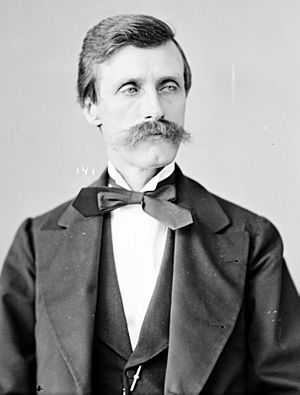Richard H. Whiteley facts for kids
Quick facts for kids
Richard Henry Whiteley
|
|
|---|---|
 |
|
| Member of the U.S. House of Representatives from Georgia's 2nd district |
|
| In office December 22, 1870 – March 3, 1875 |
|
| Preceded by | Nelson Tift |
| Succeeded by | William Ephraim Smith |
| Personal details | |
| Born | December 22, 1830 County Kildare, Ireland |
| Died | September 26, 1890 (aged 59) Boulder, Colorado |
| Resting place | Columbia Cemetery, Boulder, Colorado |
| Political party | Republican |
| Spouses | Margarette Devine Mary Strickland |
| Occupation | Attorney |
| Military service | |
| Allegiance | |
| Branch/service | |
| Rank | |
| Unit | |
| Battles/wars | American Civil War |
Richard Henry Whiteley (born December 22, 1830 – died September 26, 1890) was an important politician from Georgia. He served as a representative in the United States House of Representatives, which is part of the U.S. Congress. He was also chosen to be a U.S. Senator, though he was not officially allowed to take that seat.
Contents
Early Life and Education
Richard Henry Whiteley was born in County Kildare, Ireland. When he was about six years old, in 1836, he moved to the United States with his family. They made their new home in Georgia.
Richard received his early education at home, learning from private teachers. As he grew up, he worked in manufacturing, which means making goods in factories. Later, he decided to study law. By 1860, he passed his exams and became a lawyer, starting his practice in Bainbridge, Georgia.
Whiteley's Role in the Civil War
When the American Civil War began, Richard Whiteley did not agree with the idea of states leaving the United States (called secession). However, after Georgia decided to leave, he joined the Confederate States Army. He fought throughout the entire war. He was part of the 5th Georgia Infantry and the 2nd Georgia Sharpshooter Battalion. He rose through the ranks and became a major.
After the war, in 1867, he helped write a new constitution for the state of Georgia.
Political Career in Congress
Richard Whiteley tried to get elected to Congress in 1866 but was not successful. Later, in 1870, he was chosen to be a Senator for Georgia. However, he was not allowed to take his seat because Georgia had not yet been fully welcomed back into the United States after the Civil War.
Serving in the House of Representatives
Whiteley was elected as a Republican to the United States House of Representatives. He started serving on December 22, 1870. He was re-elected two more times and served until March 3, 1875. He tried to be re-elected again after that but did not win.
Later Life and Legacy
In 1877, after his time in Congress, Richard Whiteley moved to Boulder, Colorado. There, he continued to work as a lawyer. He passed away in Boulder on September 26, 1890. He was buried in the Masonic Cemetery in Boulder.
 | Bessie Coleman |
 | Spann Watson |
 | Jill E. Brown |
 | Sherman W. White |

